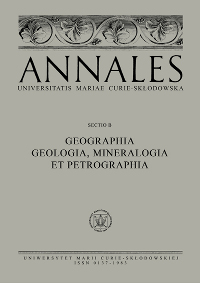Postawy i oczekiwania interesariuszy wobec zamiarów zrównoważenia turystyki w Krakowie po pandemii COVID-19
Attitudes and Expectations of Stakeholders Towards the Intentions to Sustainable Tourism
in Krakow after the COVID-19 Pandemic
Author(s): Zygmunt Kruczek, Adam Szromek, Bartłomiej Walas, Leszek MazanekSubject(s): Economy, Tourism
Published by: Wydawnictwo Naukowe Uniwersytetu Marii Curie-Sklodowskiej
Keywords: historical cities; tourism; stakeholders; confl icts; sustainable tourism; COVID-19
Summary/Abstract: Cities, especially those with historical values, are the target of mass tourism. Urban space is often the main source of disputes arising from conflicting interests, attitudes, and needs relating to the way it is used. The causes of conflicts and their scale vary widely. The aim of the research described in the article was to identify the attitudes and expectations of the inhabitants that contribute to the sustainability of the city’s tourism economy. The scope of the research also included the analysis of the intensity of conflicts between residents and tourists and the tourism sector. The research was conducted in July 2020, i.e. during the COVID-19 pandemic, using a questionnaire with an extensive structure. Statistical analysis of the obtained data included surveys obtained from 386 respondents and the division into persons representing the tourism industry (45% of respondents), as well as differentiation by place of residence, in order to distinguish districts with high tourist traffic. The conflicts occurring among the stakeholders of the tourism market were analyzed, who were classified into four groups: entrepreneurs from the tourism industry, residents of Krakow, tourists from the reception area and local government. The level of conflicts was tested using a rating scale that was calibrated against zero (0.0 ± 1.0). The respondents most often indicated the occurrence of conflicts between tourists and residents, and between representatives of the tourism industry and residents. A conflict between the inhabitants and the local government is noticed a little less frequently. The conflict between the tourists themselves is strongly denied. In the opinion of the respondents, conflicts are the result of different structures in the hierarchy of values and the different perception of the city. The common postulate of sustainable tourism in cities after the pandemic period has been identified in the research through the attitudes and expectations of residents. They mainly concern limiting the number of new accommodation facilities in historical zone, limiting short-term tourist rentals and the right of the city authorities to interfere with the rental phenomenon, increasing restrictions on entering the city center, prohibiting onerous types of transport, and restricting hours of serving alcohol.
- Issue Year: 76/2021
- Issue No: 1
- Page Range: 45-69
- Page Count: 25
- Language: Polish

